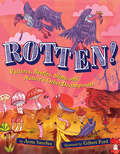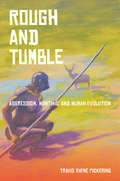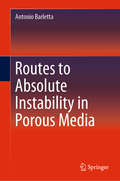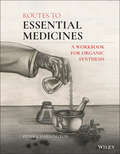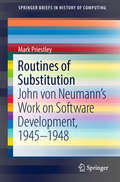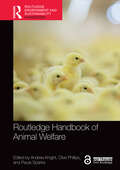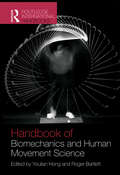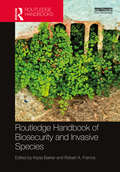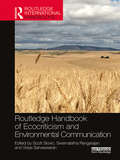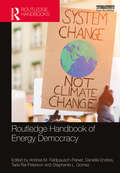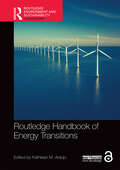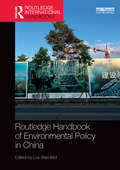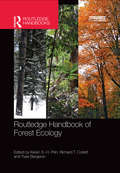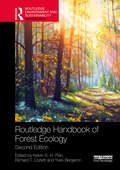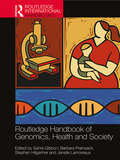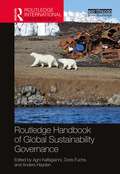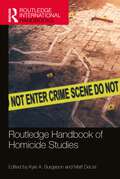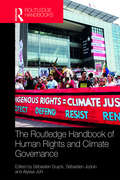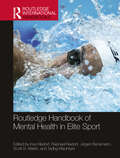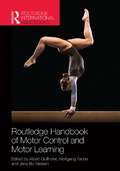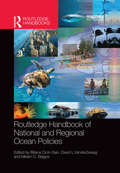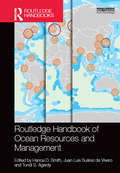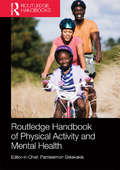- Table View
- List View
Rotten!: Vultures, Beetles, Slime, and Nature's Other Decomposers
by Anita SanchezA funny and fact-filled look at decomposition in all of its slimy glory, illustrated with dazzling full-color art by Gilbert Ford. Vultures, fungi, dung beetles, and more aid in this fascinating and sometimes smelly aspect of the life cycle that’s right under our noses.What’s that terrible smell? It’s the revolting scent of rot. But being rotten isn’t necessarily bad. If nothing ever rotted, nothing new could live.Decomposition may seem like the last stop on the food chain, but it’s just the beginning. When dead plants and animals decay, they give life to a host of other creatures, and each one helps ecosystems thrive.Decomposition happens in the forest, the ocean—even in your stomach and between your teeth! From vultures and sharks to bacteria, maggots, mushrooms, and more, discover the dirty rotten truth about one of nature’s most fascinating processes.
Rough and Tumble: Aggression, Hunting, and Human Evolution
by Travis Rayne PickeringTravis Rayne Pickering argues that the advent of ambush hunting approximately two million years ago marked a milestone in human evolution, one that established the social dynamic that allowed our ancestors to expand their range and diet. He challenges the traditional link between aggression and human predation, however, claiming that while aggressive attack is a perfectly efficient way for our chimpanzee cousins to kill prey, it was a hopeless tactic for early human hunters, who--in comparison to their large, potentially dangerous prey--were small, weak, and slow-footed. Technology that evolved from wooden spears to stone-tipped spears and ultimately to the bow and arrow increased the distance between predator and prey and facilitated an emotional detachment that allowed hunters to stalk and kill large game. Based on studies of humans and of other primates, as well as on fossil and archaeological evidence, Rough and Tumble offers a new perspective on human evolution by decoupling ideas of aggression and predation to build a more realistic understanding of what it is to be human.
Routes to Absolute Instability in Porous Media
by Antonio BarlettaThis book addresses the concepts of unstable flow solutions, convective instability and absolute instability, with reference to simple (or toy) mathematical models, which are mathematically simple despite their purely abstract character. Within this paradigm, the book introduces the basic mathematical tools, Fourier transform, normal modes, wavepackets and their dynamics, before reviewing the fundamental ideas behind the mathematical modelling of fluid flow and heat transfer in porous media. The author goes on to discuss the fundamentals of the Rayleigh-Bénard instability and other thermal instabilities of convective flows in porous media, and then analyses various examples of transition from convective to absolute instability in detail, with an emphasis on the formulation, deduction of the dispersion relation and study of the numerical data regarding the threshold of absolute instability. The clear descriptions of the analytical and numerical methods needed to obtain these parametric threshold data enable readers to apply them in different or more general cases. This book is of interest to postgraduates and researchers in mechanical and thermal engineering, civil engineering, geophysics, applied mathematics, fluid mechanics, and energy technology.
Routes to Cellulosic Ethanol
by Gustavo H Goldman Marcos Silveira BuckeridgeThe perception that civilization is crossing a period of Global Climatic Changes that can seriously threaten our lifestyle, along with energy security and the search for prosperity, are the main drivers that are pushing men to use more biomass as a source of energy. It will be crucial that such intent will include a large parcel of sustainability so that more renewable energy becomes available for populations. Because large amounts of energy are "hidden" in carbon polymers made by plants, notably carbohydrates, it is obvious that if technologies are developed to produce liquid fuels such as ethanol from carbohydrate polymers such as cellulose, men could significantly increase energy sustainability . This book reviews general aspects of biomass utilization for bioenergy production as well as strategies using biochemistry, molecular biology, chemistry and physics to disassemble plant cell walls. Recent discoveries of basic science under development in several laboratories in the world are reviewed by experts that have been intensively working with many aspects that will impact the development of the technology of production of cellulosic ethanol.
Routes to Essential Medicines: A Workbook for Organic Synthesis
by Peter J. HarringtonThis comprehensive workbook helps readers become familiar with the structures and synthetic challenges associated with nearly 300 essential medicines and gain the skills needed for pharmaceutical development. Highlights nearly three hundred medicines on the latest World Health Organization (WHO) Model List of Essential Medicines and their manufacturing routes Features exercises that equip students with the skills necessary to solve similar real-world problems Includes a retrosynthetic analysis for each commodity chemical and supplies an extensive list of key journal and information sites and a library of reagents, solvents, and conditions for many common organic reactions
Routines of Substitution: John Von Neumann's Work On Software Development, 1945-1948 (Springerbriefs In History Of Computing Ser.)
by Mark PriestleyThis work is a historical and philosophical study of the programming work carried out by John von Neumann in the period 1945-8. At the heart of the book is an examination of a manuscript featuring the earliest known surviving example of von Neumann’s coding, a routine written in 1945 to ‘mesh’ two sequences of data and intended to be part of a larger program implementing the algorithm now known as mergesort. The text of the manuscript itself, along with a preliminary document describing the code he used to write this program, are reproduced as appendices. The program is approached in three chapters describing the historical background to von Neumann’s work, the significance of the sorting application itself, and the development of the EDVAC, the machine for which the program was written. The subsequent chapters widen the focus again, discussing the subsequent evolution of the program and the crucial topic of subroutines, before concluding by situating von Neumann’s work in a number of wider contexts. The book also offers a unifying philosophical interpretation of von Neumann’s approach to coding.
Routledge Handbook of Animal Welfare (Routledge Environment and Sustainability Handbooks)
by Andrew Knight, Clive Phillips, and Paula SparksThis handbook presents a much-needed and comprehensive exploration of the rapidly growing fields of animal welfare and law. In recent years there has been increasing attention paid to our complex, multifaceted relationships with other animals, and in particular, the depth and breadth of various societal uses of animals. This has led to a reconsideration of their moral and social status, which has sometimes challenged the interests of those who use animals. In such a contested domain, sound evidence and reasoning become particularly important. Through firm commitment to such principles, this book explores the biological foundations for the moral consideration of animals and for evolving conceptualisations of animal welfare. It reviews in detail the welfare concerns associated with numerous forms of animal use. The inclusion of key recent developments such as climate change, pandemics, and antimicrobial resistance, ensures this text is among the most current in its field. The ethical implications of the various uses of animals by society are considered, and chapters provide important recommendations for reforms of practice, law, or policy. The status of animal law internationally, and in major world regions, is reviewed. Finally, the book considers human behavioural change and strategies for improving stakeholder communication and education. The handbook is essential reading for students and scholars of animal welfare, animal law and animal ethics everywhere, and for policy-makers and other professionals working in the animal welfare sector.
Routledge Handbook of Biomechanics and Human Movement Science (Routledge International Handbooks)
by Roger Bartlett Youlian HongThe Routledge Handbook of Biomechanics and Human Movement Science is a landmark work of reference. Now available in a concise paperback edition, it offers a comprehensive and in-depth survey of current theory, research and practice in sports, exercise and clinical biomechanics, in both established and emerging contexts. Including contributions from many of the world's leading biomechanists, the book is arranged into five thematic sections: biomechanics in sports injury, orthopedics and rehabilitation health and rehabilitation training, learning and coaching methodologies and systems of measurement. Drawing explicit connections between the theoretical, investigative and applied components of sports science research, this book is both a definitive subject guide and an important contribution to the contemporary research agenda in biomechanics and human movement science. It is essential reading for all students, scholars and researchers working in sports biomechanics, kinesiology, ergonomics, sports engineering, orthopaedics and physical therapy.
Routledge Handbook of Biosecurity and Invasive Species
by Kezia Barker; Robert A. FrancisThis handbook provides a comprehensive overview of the assessment and management of potentially dangerous infectious diseases, quarantined pests, invasive (alien) species, living modified organisms and biological weapons, from a multitude of perspectives. Issues of biosecurity have gained increasing attention over recent years but have often only been addressed from narrow disciplines and with a lack of integration of theoretical and practical approaches. The Routledge Handbook of Biosecurity and Invasive Species brings together both the natural sciences and the social sciences for a fully rounded perspective on biosecurity, shedding light on current national and international management frameworks with a mind to assessing possible future scenarios. With chapters focussing on a variety of ecosystems – including forests, islands, marine and coastal and agricultural land – as well as from the industrial scale to individual gardens, this handbook reviews the global state of invasions and vulnerabilities across a wide range of themes and critically analyses key threats and threatening activities, such as trade, travel, land development and climate change. Identifying invasive species and management techniques from a regional to international scale, this book will be a key reference text for a wide range of students and academics in ecology, agriculture, geography, human and animal health and interdisciplinary environmental and security studies.
Routledge Handbook of Ecocriticism and Environmental Communication (Routledge International Handbooks)
by Scott Slovic Swarnalatha Rangarajan Vidya SarveswaranEcocriticism and environmental communication studies have for many years co-existed as parallel disciplines, occasionally crossing paths but typically operating in separate academic spheres. These fields are now rapidly converging, and this handbook aims to reinforce the common concerns and methodologies of the sibling disciplines. The Routledge Handbook of Ecocriticism and Environmental Communication charts the history of the relationship between ecocriticism and environmental communication studies, while also highlighting key new paradigms in information studies, diverse examples of practical applications of environmental communication and textual analysis, and the patterns and challenges of environmental communication in non-Western societies. Contributors to this book include literary, film and religious studies scholars, communication studies specialists, environmental historians, practicing journalists, art critics, linguists, ethnographers, sociologists, literary theorists, and others, but all focus their discussions on key issues in textual representations of human–nature relationships and on the challenges and possibilities of environmental communication. The handbook is designed to map existing trends in both ecocriticism and environmental communication and to predict future directions. This handbook will be an essential reference for teachers, students, and practitioners of environmental literature, film, journalism, communication, and rhetoric, and well as the broader meta-discipline of environmental humanities.
Routledge Handbook of Energy Democracy (Routledge International Handbooks)
by Tarla Rai Peterson Danielle Endres Andrea M. Feldpausch-Parker Stephanie L. GomezThis handbook offers a comprehensive transdisciplinary examination of the research and practices that constitute the emerging research agenda in energy democracy. With protests over fossil fuels and controversies over nuclear and renewable energy technologies, democratic ideals have contributed to an emerging social movement. Energy democracy captures this movement and addresses the issues of energy access, ownership, and participation at a time when there are expanding social, political, environmental, and economic demands on energy systems. This volume defines energy democracy as both a social movement and an academic area of study and examines it through a social science and humanities lens, explaining key concepts and reflecting state-of-the-art research. The collection is comprised of six parts: 1 Scalar Dimensions of Power and Governance in Energy Democracy 2 Discourses of Energy Democracy 3 Grassroots and Critical Modes of Action 4 Democratic and Participatory Principles 5 Energy Resource Tensions 6 Energy Democracies in Practice The vision of this handbook is explicitly transdisciplinary and global, including contributions from interdisciplinary international scholars and practitioners. The Routledge Handbook of Energy Democracy will be the premier source for all students and researchers interested in the field of energy, including policy, politics, transitions, access, justice, and public participation.
Routledge Handbook of Energy Transitions (Routledge Environment and Sustainability Handbooks)
by Kathleen M. AraújoThe Routledge Handbook of Energy Transitions draws upon a unique and multidisciplinary network of experts from around the world to explore the expanding field of energy transitions.This Handbook recognizes that considerable changes are underway or are being developed for the modes in which energy is sourced, delivered, and utilized. Employing a sociotechnical approach that accounts for economics and engineering, as well as more cross-cutting factors, including innovation, policy and planning, and management, the volume considers contemporary ideas and practices that characterize the field. The book explores pressing issues, including choices about infrastructure, the role of food systems and materials, sustainability, and energy democracy. Disruption is a core theme throughout, with the authors examining topics such as digitalization, extreme weather, and COVID-19, along with regional similarities and differences. Overall, the Routledge Handbook of Energy Transitions advances the field of energy transitions by connecting ideas, taking stock of empirical insights, and challenging how we think about the theory and practice of energy systems change.This innovative volume functions as an authoritative roadmap with both regional and global relevance. It will be an essential resource for students, policymakers, researchers, and practitioners researching and working in the fields of energy transitions, planning, environmental management and policy, sustainable business, engineering, science and technology studies, political science, geography, design anthropology, and environmental justice.“With the exception of Chapter 26, no part of this book may be reprinted or reproduced or utilised in any form or by any electronic, mechanical, or other means, now known or hereafter invented, including photocopying and recording, or in any information storage or retrieval system, without permission in writing from the publishers.” Chapter 26 of this book is freely available as a downloadable Open Access PDF at http://www.taylorfrancis.com under a Creative Commons [Attribution-Non Commercial-No Derivatives (CC-BY-NC-ND)] 4.0 license.
Routledge Handbook of Environmental Policy in China (Routledge Environment and Sustainability Handbooks)
by Eva SternfeldDuring the last few decades, China has accomplished unprecedented economic growth and has emerged as the second largest economy in the world. This ‘economic miracle’ has led hundreds of millions of people out of poverty, but has also come at a high cost. Environmental degradation and the impact of environmental pollution on health are nowadays issues of the greatest concern for the Chinese public and the government. The Routledge Handbook of Environmental Policy in China focuses on the environmental challenges of China’s rapidly growing economy and provides a comprehensive overview of the policies developed to address the environmental crisis. Leading international scholars and practitioners examine China’s environmental governance efforts from an interdisciplinary perspective. Divided into five parts, the handbook covers the following key issues: Part I: Development of Environmental Policy in China - Actors and Institutions Part II: Key issues and Strategies for Solution Part III: Policy Instruments and Enforcement Part IV: Related Policy Fields – Conflicts and Synergies Part V: China’s Environmental Policy in the International Context This comprehensive handbook will be an invaluable resource to students and scholars of environmental policy and politics, development studies, Chinese studies, geography and international relations.
Routledge Handbook of Forest Ecology (Routledge Environment and Sustainability Handbooks)
by Richard T. Corlett Kelvin S.-H. Peh Yves BergeronThis comprehensive handbook provides a unique resource covering all aspects of forest ecology from a global perspective. It covers both natural and managed forests, from boreal, temperate, sub-tropical and tropical regions of the world. The book is divided into seven parts, addressing the following themes: forest types forest dynamics forest flora and fauna energy and nutrients forest conservation and management forests and climate change human impacts on forest ecology. While each chapter can stand alone as a suitable resource for a lecture or seminar, the complete book provides an essential reference text for a wide range of students of ecology, environmental science, forestry, geography and natural resource management. Contributors include leading authorities from all parts of the world.
Routledge Handbook of Forest Ecology (Routledge Environment and Sustainability Handbooks)
by Richard T. Corlett Yves Bergeron Pehm, Kelvin S.-H.The Routledge Handbook of Forest Ecology is an essential resource covering all aspects of forest ecology from a global perspective.This new edition has been fully revised and updated throughout to reflect the profound and unprecedented changes in both forests and climates since the publication of the first edition in 2015. The handbook reflects key developments in the field of forest dynamics and large-scale processes, as well as the changes that are now manifesting in different types of forests across the globe as a result of climate change. It covers both natural and managed forests, from boreal, temperate, sub-tropical and tropical regions of the world. In this second edition, the breadth of the handbook has been expanded with new chapters on mountain forests, monodominance, pathogens and invertebrate pests and amphibians and reptiles in forest ecosystems. Original author teams are complemented by the addition of new authors to offer fresh perspectives, and the second edition places greater emphasis on the applicability of each topic at a global level. The handbook is divided into seven parts:• Part I: The forest• Part II: Forest dynamics• Part III: Forest flora and fauna• Part IV: Energy and nutrients• Part V: Forest conservation and management• Part VI: Forest and climate change• Part VII: Human ecologyThe Routledge Handbook of Forest Ecology is an essential reference text for a wide range of students and scholars of ecology, environmental science, forestry, geography and natural resource management.
Routledge Handbook of Genomics, Health and Society (Routledge International Handbooks)
by Barbara Prainsack Stephen Hilgartner Sahra Gibbon Janelle LamoreauxThe Handbook provides an essential resource at the interface of Genomics, Health and Society, and forms a crucial research tool for both new students and established scholars across biomedicine and social sciences. Building from and extending the first Routledge Handbook of Genetics and Society, the book offers a comprehensive introduction to pivotal themes within the field, an overview of the current state of the art knowledge on genomics, science and society, and an outline of emerging areas of research. Key themes addressed include the way genomic based DNA technologies have become incorporated into diverse arenas of clinical practice and research whilst also extending beyond the clinic; the role of genomics in contemporary ‘bioeconomies’; how challenges in the governance of medical genomics can both reconfigure and stabilise regulatory processes and jurisdictional boundaries; how questions of diversity and justice are situated across different national and transnational terrains of genomic research; and how genomics informs – and is shaped by – developments in fields such as epigenetics, synthetic biology, stem cell, microbial and animal model research. Presenting cutting edge research from leading social science scholars, the Handbook provides a unique and important contribution to the field. It brings a rich and varied cross disciplinary social science perspective that engages with both the history and contemporary context of genomics and ‘post-genomics’, and considers the now global and transnational terrain in which these developments are unfolding.
Routledge Handbook of Global Sustainability Governance (Routledge International Handbooks)
by Anders Hayden Agni Kalfagianni Doris FuchsThe Routledge Handbook of Global Sustainability Governance provides a state-of-the-art review of core debates and contributions that offer a more normative, critical, and transformatively aspirational view on global sustainability governance. In this landmark text, an international group of acclaimed scholars provides an overview of key analytical and normative perspectives, material and ideational structural barriers to sustainability transformation, and transformative strategies. Drawing on pivotal new and contemporary research, the volume highlights aspects to be considered and blind spots to be avoided when trying to understand and implement global sustainability governance. In this context, the authors of this book debunk many myths about all-too optimistic accounts of progress towards a sustainability transition. Simultaneously, they suggest approaches that have the potential for real sustainability transformation and systemic change, while acknowledging existing hurdles. The wide-ranging chapters in the collection are organised into four key parts: • Part 1: Conceptual lenses • Part 2: Ethics, principles, and debates • Part 3: Key challenges • Part 4: Transformative approaches This handbook will serve as an important resource for academics and practitioners working in the fields of sustainability governance and environmental politics.
Routledge Handbook of Homicide Studies (Routledge International Handbooks)
by Matt DeLisi Kyle A. BurgasonThe Routledge Handbook of Homicide Studies comprehensively examines the topic of homicide from a diverse collection of perspectives and backgrounds. It brings together original contributions on homicide, with a focus on the broad range of impacts of homicide from a multitude of disciplines that evaluate and examine homicide in actual practice and theory. The editors have assembled a comprehensive collection highlighting the multifaceted causes and ramifications of homicide both across the United States and globally, with chapters exploring the current state of homicide, typologies of homicides offenders, causes and correlates of homicide, homicides and the criminal justice system, and a professional observations chapters authored by some of the leading practicing professionals in the world, many of whom have made pivotal contributions to the evaluation and investigation of homicide offenders and cases. Providing state-of-the-art scholarship on homicide in modern society, this handbook is a key collection and an invaluable resource for students, researchers, and practitioners engaged in the study of homicide across a diverse range of disciplines, including criminal justice and criminology, psychology, sociology, forensics, interdisciplinary departments, and sociolegal studies.
Routledge Handbook of Homicide Studies (Routledge International Handbooks)
by Matt DeLisi Kyle A. BurgasonThe Routledge Handbook of Homicide Studies comprehensively examines the topic of homicide from a diverse collection of perspectives and backgrounds. It brings together original contributions on homicide, with a focus on the broad range of impacts of homicide from a multitude of disciplines that evaluate and examine homicide in actual practice and theory. The editors have assembled a comprehensive collection highlighting the multifaceted causes and ramifications of homicide both across the United States and globally, with chapters exploring the current state of homicide, typologies of homicides offenders, causes and correlates of homicide, homicides and the criminal justice system, and a professional observations chapters authored by some of the leading practicing professionals in the world, many of whom have made pivotal contributions to the evaluation and investigation of homicide offenders and cases. Providing state-of-the-art scholarship on homicide in modern society, this handbook is a key collection and an invaluable resource for students, researchers, and practitioners engaged in the study of homicide across a diverse range of disciplines, including criminal justice and criminology, psychology, sociology, forensics, interdisciplinary departments, and sociolegal studies.
Routledge Handbook of Human Rights and Climate Governance (Routledge International Handbooks)
by Sébastien Jodoin Sébastien Duyck Alyssa JohlOver the last decade, the world has increasingly grappled with the complex linkages emerging between efforts to combat climate change and to protect human rights around the world. The Paris Climate Agreement adopted in December 2015 recognized the necessity for governments to take into consideration their human rights obligations when taking climate action. However, important gaps remain in understanding how human rights can be used in practice to develop and implement effective and equitable solutions to climate change at multiple levels of governance. This book brings together leading scholars and practitioners to offer a timely and comprehensive analysis of the opportunities and challenges for integrating human rights in diverse areas and forms of global climate governance. The first half of the book explores how human rights principles and obligations can be used to reconceive climate governance and shape responses to particular aspects of climate change. The second half of the book identifies lessons in the integration of human rights in climate advocacy and governance and sets out future directions in this burgeoning domain. Featuring a diverse range of contributors and case studies, this Handbook will be an essential resource for students, scholars, practitioners and policy makers with an interest in climate law and governance, human rights and international environmental law.
Routledge Handbook of Mental Health in Elite Sport (Routledge International Handbooks)
by Jürgen Beckmann Scott B. Martin Insa Nixdorf Raphael Nixdorf Tadhg MacIntyreMental health is a rapidly increasing topic in the field of sport psychology. As the relevance of athletes’ mental health has come to prominence through emerging research, there is a high demand for evidence-based practice in order to promote athletes' mental health and prevent mental disorders as well as maladaptive syndromes. However, there is currently no comprehensive overview available that highlights the empirical evidence for the constructs of mental health, illustrating the latest developments in research, or that highlights implications for future science and practice. The Routledge Handbook of Mental Health in Elite Sport delivers such an understanding and overview for this field, offering students, researchers, mental health professionals, applied sport psychologists, and coaches a state-of-the-art and insightful summary of science in the newly emerged field of clinical sport psychology and mental health in athletes. This thorough volume covers major current and emerging topics on mental health and mental illness (e.g., depression), subclinical syndromes (e.g., burnout), as well as a comprehensive overview of research on prevention (e.g., green exercise) and treatment of mental health disorders in athletes and will be a vital resource for researchers, academics, and students in the fields of sport psychology, clinical psychology, sport coaching, sport sciences, health psychology, and physical activity and related disciplines.
Routledge Handbook of Motor Control and Motor Learning (Routledge International Handbooks)
by Gollhofer Albert Taube Wolfgang Bo Nielsen JensThe Routledge Handbook of Motor Control and Motor Learning is the first book to offer a comprehensive survey of neurophysiological, behavioural and biomechanical aspects of motor function. Adopting an integrative approach, it examines the full range of key topics in contemporary human movement studies, explaining motor behaviour in depth from the molecular level to behavioural consequences. The book contains contributions from many of the world´s leading experts in motor control and motor learning, and is composed of five thematic parts: Theories and models Basic aspects of motor control and learning Motor control and learning in locomotion and posture Motor control and learning in voluntary actions Challenges in motor control and learning Mastering and improving motor control may be important in sports, but it becomes even more relevant in rehabilitation and clinical settings, where the prime aim is to regain motor function. Therefore the book addresses not only basic and theoretical aspects of motor control and learning but also applied areas like robotics, modelling and complex human movements. This book is both a definitive subject guide and an important contribution to the contemporary research agenda. It is therefore important reading for students, scholars and researchers working in sports and exercise science, kinesiology, physical therapy, medicine and neuroscience.
Routledge Handbook of National and Regional Ocean Policies (Routledge Environment and Sustainability Handbooks)
by Biliana Cicin-Sain, David L. VanderZwaag, and Miriam C. BalgosThis comprehensive handbook, prepared by leading ocean policy academics and practitioners from around the world, presents in-depth analyses of the experiences of fifteen developed and developing nations and four key regions of the world that have taken concrete steps toward cross-cutting and integrated national and regional ocean policy. All chapters follow a common framework for policy analysis. While most coastal nations of the world already have a variety of sectoral policies in place to manage different uses of the ocean (such as shipping, fishing, oil and gas development), in the last two decades, the coastal nations covered in the book have undertaken concerted efforts to articulate and implement an integrated, ecosystem-based vision for the governance of ocean areas under their jurisdiction. This includes goals and procedures to harmonize existing uses and laws, to foster sustainable development of ocean areas, to protect biodiversity and vulnerable resources and ecosystems, and to coordinate the actions of the many government agencies that are typically involved in oceans affairs. The book highlights the serious conflicts of use in most national ocean zones and the varying attempts by nations to follow the prescriptions emanating from the 1982 UN Law of the Sea Convention and the outcomes of the 1992, 2002, and 2012 sustainable development summits. The interrelationship among uses and processes in the coast and ocean requires that ocean governance be integrated, precautionary, and anticipatory. Overall, the book provides a definitive state-of-the-art review and analysis of national and regional ocean policies around the world.
Routledge Handbook of Ocean Resources and Management (Routledge Environment and Sustainability Handbooks)
by Hance D. Smith Tundi S. Agardy Juan Luis Suárez de ViveroThis comprehensive handbook provides a global overview of ocean resources and management by focusing on critical issues relating to human development and the marine environment, their interrelationships as expressed through the uses of the sea as a resource, and the regional expression of these themes. The underlying approach is geographical, with prominence given to the biosphere, political arrangements and regional patterns – all considered to be especially crucial to the human understanding required for the use and management of the world's oceans. Part one addresses key themes in our knowledge of relationships between people and the sea on a global scale, including economic and political issues, and understanding and managing marine environments. Part two provides a systematic review of the uses of the sea, grouped into food, ocean space, materials and energy, and the sea as an environmental resource. Part three on the geography of the sea considers management strategies especially related to the state system, and regional management developments in both core economic regions and the developing periphery. The primary themes within each chapter are governance (including institutional and legal bases); policy – sets of ideas governing management; and management, both technical and general.
Routledge Handbook of Physical Activity and Mental Health (Routledge International Handbooks Ser.)
by Panteleimon EkkekakisA growing body of evidence shows that physical activity can be a cost-effective and safe intervention for the prevention and treatment of a wide range of mental health problems. As researchers and clinicians around the world look for evidence-supported alternatives and complements to established forms of therapy (medication and psychotherapy), interest in physical activity mounts. The Routledge Handbook of Physical Activity and Mental Health offers the most comprehensive review of the research evidence on the effects of physical activity on multiple facets of mental health. Written by a team of world-leading international experts, the book covers ten thematic areas: physical activity and the ‘feel good’ effect anxiety disorders depression and mood disorders self-perceptions and self-evaluations cognitive function across the lifespan psychosocial stress pain energy and fatigue addictions quality of life in special populations. This volume presents a balanced assessment of the research evidence, highlights important directions for future work, and draws clear links between theory, research, and clinical practice. As the most complete and authoritative resource on the topic of physical activity and mental health, this is essential reading for researchers, students and practitioners in a wide range of fields, including clinical and health psychology, psychiatry, neuroscience, behavioural and preventive medicine, gerontology, nursing, public health and primary care.
